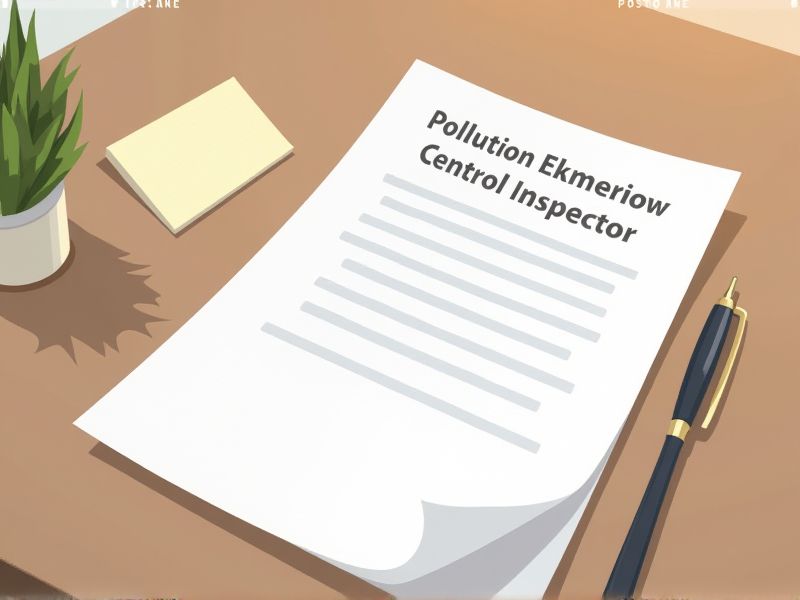
Pollution Control Inspectors are tasked with ensuring adherence to environmental laws and regulations, which necessitates a comprehensive understanding of in-depth scientific and technical principles. Certifications equip inspectors with the necessary knowledge to effectively assess pollution sources and implement control measures. Acquiring these credentials also demonstrates expertise and commitment to staying updated with evolving environmental standards. Below are several essential certifications that can enhance the efficacy and credibility of a Pollution Control Inspector.
EPA Certified Environmental Inspector
The need for an EPA Certified Environmental Inspector arises from their specialized knowledge in identifying and assessing environmental hazards, leading to more effective pollution control measures. Their certification ensures adherence to federal regulations, reducing the risk of legal penalties for non-compliance in pollution control efforts. Data shows certified inspectors enhance the accuracy and reliability of environmental assessments, resulting in more targeted and efficient remediation strategies. In their role, they bridge the gap between industries and regulatory bodies, fostering a culture of environmental accountability and awareness.
ISO 14001 Lead Auditor Certification
ISO 14001 Lead Auditor Certification is essential for a Pollution Control Inspector because it enhances their understanding of environmental management systems. It equips them with the skills to effectively assess and ensure compliance with environmental regulations. This certification provides credibility, signifying that inspectors are capable of implementing international standards to reduce pollution. It also enhances their ability to identify areas for improvement within organizations' environmental policies.
Environmental Management System (EMS) Certification
Environmental Management System (EMS) Certification equips Pollution Control Inspectors with a standardized framework to identify and control environmental impacts effectively. This certification enhances the inspector's ability to ensure compliance with environmental laws, thereby reducing potential fines and legal actions against facilities. Certified inspectors gain improved skills in risk management, leading to more efficient pollution control strategies. EMS Certification often boosts public trust, as it demonstrates a commitment to sustainable practices and transparent operations.
Certified Hazardous Materials Manager (CHMM)
A Certified Hazardous Materials Manager (CHMM) possesses specialized knowledge crucial for identifying and handling hazardous substances, directly impacting the effectiveness of a Pollution Control Inspector's work. CHMM training provides inspectors with the skills necessary to assess and mitigate risks associated with hazardous materials, improving public and environmental safety. Regulatory compliance is a critical aspect of pollution control, and a CHMM ensures that inspections align with legal standards and best practices. The presence of a CHMM enhances the accuracy of pollution assessments and informs better decision-making in environmental management.
Certified Industrial Hygienist (CIH)
The Certified Industrial Hygienist (CIH) ensures accurate assessment of occupational and environmental health risks, critical for pollution control inspectors to identify and mitigate hazards. Possessing a CIH certification enhances the expertise in evaluating air and water pollutants, aiding inspectors in enforcing regulations effectively. Through comprehensive knowledge of toxicology and industrial hygiene, CIHs contribute to developing strategies to prevent contamination and protect public health. Their certified skills in risk management and exposure assessment are fundamental in crafting compliance strategies and reducing pollution.
Certified Professional in Environmental Auditing
The complexity of environmental regulations demands that Pollution Control Inspectors possess a Certified Professional in Environmental Auditing (CPEA) credential to ensure compliance and enforcement accuracy. CPEA certification equips inspectors with the necessary skills to effectively assess and mitigate environmental risks. The rigorous auditing process provided by CPEA enhances analytical capabilities, leading to more informed decision-making in pollution control. Organizations benefit from hiring certified professionals by minimizing regulatory penalties and maintaining sustainable operational practices.
Air Quality Specialist Certification
Air Quality Specialist Certification enhances a pollution control inspector's technical knowledge, allowing them to accurately assess air quality standards and guidelines. This certification equips inspectors with the skills to identify sources of pollution effectively, leading to improved enforcement of environmental regulations. Certified inspectors gain credibility and public trust, essential for cooperative efforts in mitigating air pollution. Certification ensures updated knowledge of technologies and methodologies, crucial in adapting to evolving environmental challenges.
Water and Wastewater Operator Certification
Water and Wastewater Operator Certification provides essential knowledge of treatment processes, which is crucial for a Pollution Control Inspector to assess compliance effectively. This certification ensures that inspectors are equipped with the technical expertise to identify and mitigate potential contamination sources in water systems. Knowledge gained from such certification enhances an inspector's ability to develop strategies for sustainable water management and pollution prevention. Regulatory understanding from the certification process aids inspectors in enforcing environmental standards more accurately.
Environmental Law and Compliance Certification
Environmental Law and Compliance Certification equips Pollution Control Inspectors with the necessary knowledge to enforce regulations effectively, ensuring industries adhere to environmental standards. Certification instills a structured framework for evaluating compliance, minimizing the risk of environmental harm caused by industrial activities. Trained inspectors are better prepared to identify and resolve compliance issues, reducing pollution through enforced legal measures. Certification also encourages public trust by showcasing inspectors' commitment to protecting environmental integrity through professional competence.
LEED Accredited Professional (LEED AP)
A LEED Accredited Professional (LEED AP) understands sustainable building practices, which aids a Pollution Control Inspector in identifying and promoting greener strategies to reduce environmental impact. This accreditation equips inspectors with knowledge on energy-efficient design and construction, enhancing their ability to recommend improvements that decrease pollution. The skills gained from LEED AP certification enable inspectors to consistently enforce standards aimed at minimizing emissions and resource waste. By holding a LEED AP credential, a Pollution Control Inspector can better collaborate with builders and developers to ensure adherence to environmentally friendly practices.
Summary
By obtaining certifications, you enhance your credibility and marketability in the field of pollution control. This can lead to improved job opportunities and increased salary potential. Certification often results in better understanding and application of pollution control techniques. Consequently, you contribute to more effective environmental protection and compliance with regulations.
